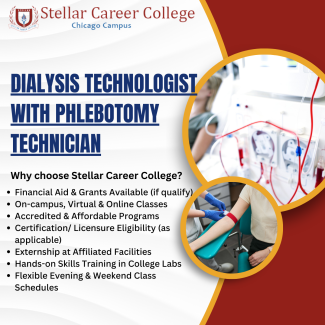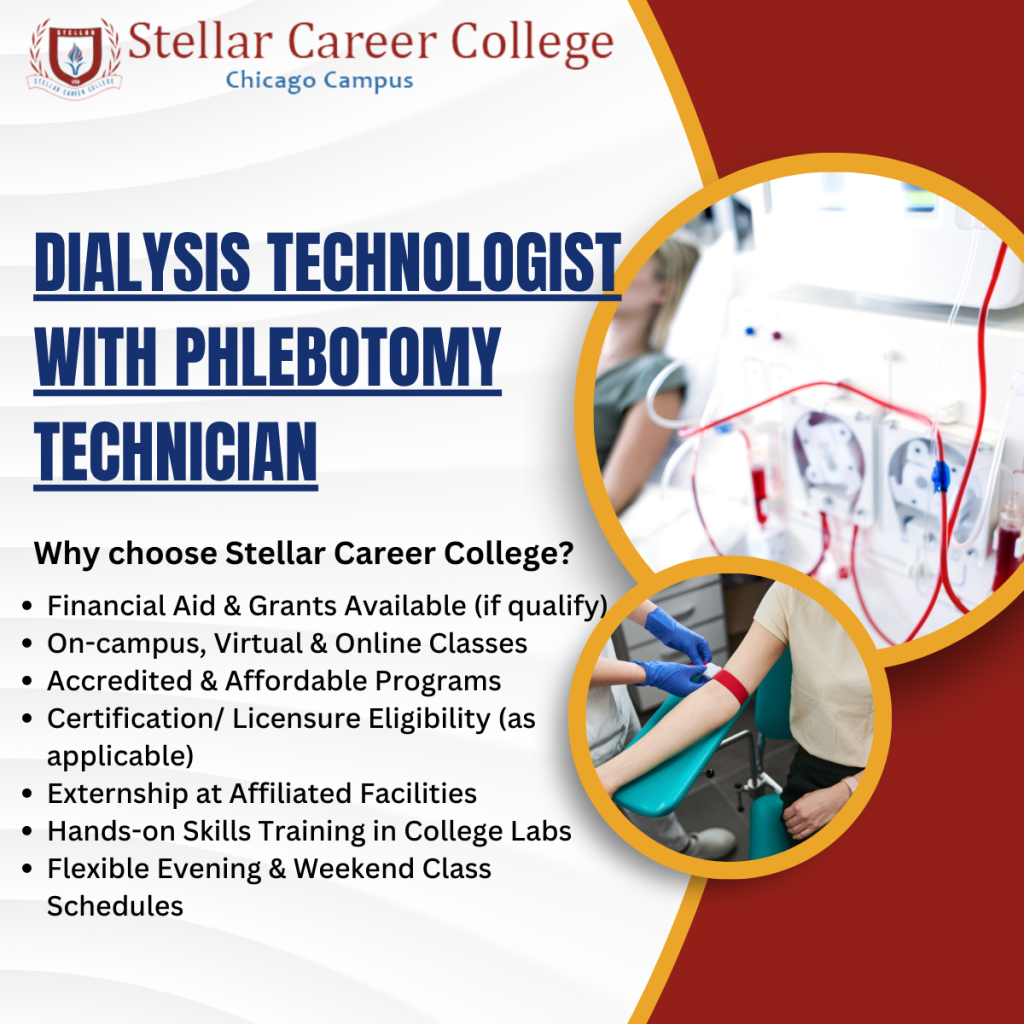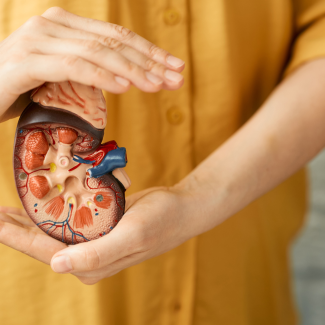Dialysis Technologist with Phlebotomy Technician: A Stellar Career College
Are you interested in pursuing a rewarding career in healthcare? Read on to discover the role of a Dialysis Technologist with Phlebotomy Technician, their responsibilities, and the opportunities this field offers.
The healthcare industry provides numerous opportunities for individuals seeking fulfilling careers. One such career path that combines technical expertise and compassion is that of a Dialysis Technologist with Phlebotomy Technician. This article explores the crucial role of a Dialysis Technologist with Phlebotomy Technician, their responsibilities, and the immense value they bring to patient care.
- Overview of Dialysis Technologist with Phlebotomy Technician
- Education and Training Requirements
- Duties and Responsibilities
- Dialysis Procedures and Techniques
- Phlebotomy Techniques and Best Practices
- Infection Control and Safety Measures
- Equipment Handling and Maintenance
- Communication Skills and Patient Interaction
- Career Prospects and Job Outlook
- Continuing Education and Professional Development
| Table of Contents |
|---|
| 1. Overview of Dialysis Technologist with Phlebotomy Technician |
| 2. Education and Training Requirements |
| 3. Duties and Responsibilities |
| 4. Dialysis Procedures and Techniques |
| 5. Phlebotomy Techniques and Best Practices |
| 6. Infection Control and Safety Measures |
| 7. Equipment Handling and Maintenance |
| 8. Communication Skills and Patient Interaction |
| 9. Career Prospects and Job Outlook |
| 10. Continuing Education and Professional Development |

Overview of Dialysis Technologist with Phlebotomy Technician
A Dialysis Technologist with Phlebotomy Technician plays a vital role in the healthcare system, specifically within the domain of renal care and diagnostic laboratory services. These professionals are responsible for assisting in dialysis procedures and performing phlebotomy to collect blood samples for laboratory analysis. They work alongside doctors, nurses, and other healthcare professionals to provide essential support in the diagnosis and treatment of various medical conditions.
Education and Training Requirements
Becoming a Dialysis Technologist with Phlebotomy Technician requires a combination of formal education and practical training. Most individuals pursue a diploma or associate degree program in Dialysis Technology and Phlebotomy. These programs provide comprehensive knowledge and hands-on experience in operating dialysis equipment, performing phlebotomy techniques, understanding laboratory procedures, and ensuring patient safety.
Duties and Responsibilities
Dialysis Technologists with Phlebotomy Technician training are equipped with a wide range of skills to carry out their duties effectively. Their responsibilities include preparing dialysis machines, monitoring patients during dialysis treatment, maintaining accurate records, collecting blood samples, performing venipuncture, and ensuring the cleanliness and functionality of medical equipment.
Dialysis Procedures and Techniques
As part of their role, Dialysis Technologists assist in dialysis procedures to help patients with impaired kidney function. They are knowledgeable in the operation and maintenance of dialysis machines, including setting up the necessary parameters and monitoring patients’ vital signs throughout the process. Additionally, they are trained in identifying and addressing complications that may arise during dialysis sessions.
Phlebotomy Techniques and Best Practices
The phlebotomy aspect of a Dialysis Technologist with Phlebotomy Technician’s role involves drawing blood samples for diagnostic purposes. These professionals are skilled in various venipuncture techniques, ensuring a smooth and comfortable experience for patients. They adhere to strict protocols to maintain sample integrity, accurately label specimens, and handle them appropriately for laboratory analysis.
Infection Control and Safety Measures
Maintaining a safe and sterile environment is crucial in healthcare settings. Dialysis Technologists with Phlebotomy Technician receive extensive training in infection control measures and follow strict protocols to minimize the risk of cross-contamination. They are well-versed in maintaining aseptic conditions, handling biohazardous waste, and ensuring the safety of patients, staff, and themselves.
Equipment Handling and Maintenance
Dialysis Technologists are responsible for handling and maintaining the dialysis equipment used during treatments. They ensure proper calibration, perform routine maintenance tasks, and troubleshoot technical issues that may arise. Their expertise ensures that the dialysis machines function optimally, providing effective treatment to patients with renal disorders.
Communication Skills and Patient Interaction
Effective communication is vital when working in a healthcare environment. Dialysis Technologists with Phlebotomy Technician develop excellent communication skills to interact with patients, explaining procedures, addressing concerns, and providing emotional support. They work closely with patients, fostering a compassionate and empathetic environment during their dialysis sessions.
Career Prospects and Job Outlook
The demand for Dialysis Technologists with Phlebotomy Technician is expected to grow significantly in the coming years. The aging population and the prevalence of chronic kidney diseases contribute to the need for skilled professionals in renal care. Graduates of Dialysis Technology and Phlebotomy programs can find employment in hospitals, dialysis centers, diagnostic laboratories, and other healthcare facilities.
Continuing Education and Professional Development
To stay abreast of advancements in healthcare technology and maintain their professional competence, Dialysis Technologists with Phlebotomy Technician often pursue continuing education and participate in professional development programs. These opportunities allow them to expand their knowledge, learn new techniques, and stay updated with the latest industry practices.
FAQs
- Q: What is the role of a Dialysis Technologist with Phlebotomy Technician? A: Dialysis Technologists with Phlebotomy Technician assist in dialysis procedures and collect blood samples for analysis.
- Q: What education is required to become a Dialysis Technologist with Phlebotomy Technician? A: Individuals typically pursue a diploma or associate degree program in Dialysis Technology and Phlebotomy.
- Q: Where do Dialysis Technologists with Phlebotomy Technician work? A: They can find employment in hospitals, dialysis centers, and diagnostic laboratories.
- Q: What are the career prospects for Dialysis Technologists with Phlebotomy Technician? A: The demand for these professionals is expected to grow due to the rising prevalence of kidney diseases.
- Q: Do Dialysis Technologists with Phlebotomy Technician interact with patients? A: Yes, they communicate with patients, explain procedures, and provide emotional support during dialysis sessions.
- Q: How do Dialysis Technologists with Phlebotomy Technician ensure patient safety? A: They follow strict infection control measures, maintain aseptic conditions, and handle biohazardous waste appropriately.
- Q: What are the primary responsibilities of Dialysis Technologists with Phlebotomy Technician? A: Their duties include preparing dialysis machines, monitoring patients, collecting blood samples, and maintaining records.
- Q: What are the key skills required for this career? A: Strong technical skills, attention to detail, communication skills, and compassion for patient care are essential.
- Q: Can Dialysis Technologists with Phlebotomy Technician pursue further education? A: Yes, they can engage in continuing education and professional development to enhance their knowledge and skills.
- Q: How does the aging population impact the demand for Dialysis Technologists with Phlebotomy Technician? A: As the population ages, the prevalence of kidney diseases increases, leading to a higher demand for qualified professionals in renal care.
-
- Q: What are the prerequisites for enrolling in a Dialysis Technology and Phlebotomy program? A: While specific requirements may vary, most programs require a high school diploma or equivalent and may have additional prerequisites such as coursework in biology or healthcare-related subjects.
- Q: Are there any certification or licensure requirements for Dialysis Technologists with Phlebotomy Technician? A: Certification requirements vary by state and employer. Some states may require licensure or certification, while others may recognize nationally recognized certifications such as those offered by organizations like the National Healthcareer Association (NHA) or the American Society for Clinical Pathology (ASCP).
- Q: Can Dialysis Technologists with Phlebotomy Technician specialize in a particular area? A: Yes, some professionals choose to specialize in specific areas such as pediatric dialysis, home dialysis, or specialized phlebotomy techniques. Additional training and experience may be required to pursue these specialized roles.
- Q: What is the typical work schedule for Dialysis Technologists with Phlebotomy Technician? A: Work schedules can vary depending on the healthcare facility. Some Dialysis Technologists may work standard daytime hours, while others may work evening shifts or be on-call for emergency situations.
- Q: How physically demanding is the job of a Dialysis Technologist with Phlebotomy Technician? A: The role can involve some physical activity, including lifting and positioning patients, standing for extended periods, and handling medical equipment. Proper body mechanics and adherence to safety guidelines are essential to minimize physical strain.
- Q: Are there opportunities for advancement in this career? A: Yes, with experience and additional education, Dialysis Technologists with Phlebotomy Technician can pursue supervisory or management roles within dialysis units, take on teaching positions, or even become consultants in the field.
- Q: Can Dialysis Technologists with Phlebotomy Technician work in research settings? A: Yes, some professionals may find opportunities to work in research facilities or participate in clinical trials related to kidney diseases and dialysis treatments.
- Q: What qualities are important for success in this career? A: Strong attention to detail, excellent communication skills, empathy, the ability to work well under pressure, and a commitment to patient care are all important qualities for success as a Dialysis Technologist with Phlebotomy Technician.
- Q: Are there opportunities for Dialysis Technologists with Phlebotomy Technician to engage in community outreach or patient education? A: Yes, many healthcare facilities encourage their professionals to engage in community outreach programs, patient education initiatives, and support groups to raise awareness about kidney health and related conditions.
- Q: How do Dialysis Technologists with Phlebotomy Technician stay updated with advancements in the field? A: Continuing education, attending conferences, joining professional organizations, and participating in workshops or webinars are some of the ways professionals stay informed about the latest developments and best practices in dialysis technology and phlebotomy.
Remember, pursuing a career as a Dialysis Technologist with Phlebotomy Technician can open doors to a fulfilling and impactful healthcare profession.
Conclusion
A career as a Dialysis Technologist with Phlebotomy Technician offers a unique blend of technical expertise and compassionate patient care. These professionals play a vital role in the diagnosis and treatment of kidney diseases and contribute to the overall well-being of patients. With the increasing demand for skilled individuals in renal care, pursuing a path in Dialysis Technology and Phlebotomy can lead to a rewarding and fulfilling career in the healthcare industry.



